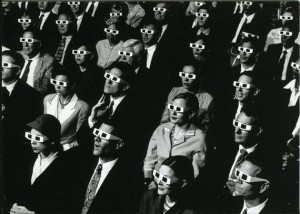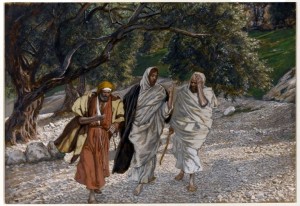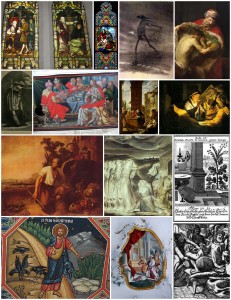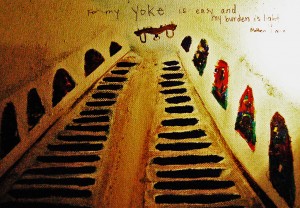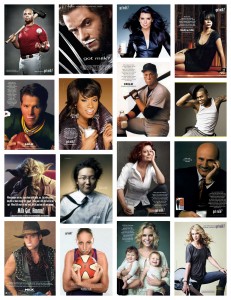“Double Vision”
Preached by Elder Joe Martinoni
Sunday, July 20, 2014
At First Presbyterian Church, Rockaway, NJ
Scripture: Genesis 1:1-2:3 (4th “Engage” Sunday)
If we examine our prayer of confession from this morning, we can see some common, repeating elements that this prayer contains every Sunday. We acknowledge the goodness of God, and the wonder of His creation. We state that we know God wants only the best for us and from us. We admit however, that we fall short of that vision that God has for us, “missing the mark” as stated by Ray Jones in this morning’s video presentation. We end by asking God to forgive us and to keep on showing us the way. We are reminding ourselves and asking for God’s help in doing the same, to keep the clear vision God had for us from the time of creation foremost in our minds as we live our daily lives.
The Genesis narrative was unique in its time and place, because in ancient Israel there were many competing creation narratives, and they were all polytheistic – creation was forged out of the battle of many Gods who each had a specialty in the act of creation. In the story of God’s act of creation however, God is God and the only God, and God’s creation is made out of pure love and not out of conflict. Everything about this creation story is good. Only in our act of sinning can this creation become broken.
The act of “missing the mark” or falling short – that which is called “sin” – what does it mean when we sin or fall short? Genesis provides a unique account of the relationship between humans and God. Somehow, God decides to makes humans “in our image, according to our likeness.” We stand as the crowning achievement of the creation event. After the creation of humans, God, in his powerful word, blesses them and declares them as good. God is one. God is powerful. And God created us in his image.
This opening passage of our Bible constitutes the essence of good news. From the beginning, God has made us partners in achieving the vision of perfection cast here in Genesis; everything started out as “good”, designed to flourish, as part of the fulfillment of this vision. Sin is when we are no longer satisfied to be partners, but want to be in control. We have a competing vision with that of the divine. Suddenly what is “good” is now “not good enough”, and creation is broken by our own acts of defiance.
But God doesn’t stop creating. God never loses the vision of the original perfect creation – a dream of a perfect world where we glorify the one who created us by living as we were intended. God became one of us for a short time to continue to show us the way and set us on a path for healing this broken world. Healing the world is something we can’t do by ourselves, but only with the help of God become human, in the form of Jesus the Christ. Jesus made the ultimate sacrifice to remind us that God loves us and still wants us to be partners in bringing forth this vision of a perfect creation in God’s kingdom come.
Just as the spirit of God breathed on the waters at creation, God’s Holy Spirit lives within each of us, sustains us and inspires us to do better. The Holy Spirit breathes this vision into our consciousness every day that we live. Every time we try to resist the call of the Spirit to this divine vision of perfection, we can cause pain to ourselves and others. We can get things pretty messed up. Is there any hope for us? Yes, there is. What happens when we fall short? We examine what we’ve done, as in our corporate and personal prayers of confession, and we strive to do better. But how do we know when we’ve got it right? When will we achieve the fulfillment of that perfect vision that God so desperately wants for us? I believe it goes beyond simply not doing harm. It goes beyond doing good for others. I believe each of us was made for a uniquely perfect purpose. Will God hit us over the head with a baseball bat if we don’t achieve this perfection? Sometimes in life it can feel like this is happening, but I believe that God will, no matter what, work to use us for the best possible outcome that we can achieve.
One of my favorite definitions of “call” – that which each of us is meant to do – was stated beautifully by Frederick Buechner: “Neither the hair shirt nor the soft berth will do. The place God calls you to is the place where your deep gladness and the world’s deep hunger meet.”
Our deep gladness is most realized when we fulfill that most perfect purpose for which God has created each of us. Whenever we have a competing vision to that of God’s, it is almost as if we are experiencing double-vision. We see two images, and it is confusing, and can give us a headache. All we can do is to keep on trying, keep on praying and growing in our faith together. And, maybe someday, we can bring ourselves into focus, where the two visions are aligned, and God rejoices for the achievement of the healing of the world.
I was inspired in part to use this “double-vision” metaphor by the writings of a Rabbi named Shlomo Carlebach (1925-1994) who said, “The world to come is a big movie theater! In one eye you see every moment of your life – your actions, thoughts, desires; your moments of fear and of joy. In your other eye you see every moment of what your life was to be – again, every detail of the totality of who you are. When you see two different movies simultaneously, these are moments of regret, and when you see the same movie with both eyes, these are moments of heaven.”
This concept doesn’t apply only to each of us as individuals, each aspiring to claim our own perfect call to fulfill God’s purpose. It applies to the church as well. When we went through the New Beginnings process over two years ago, we collectively came to the conclusion that we couldn’t fully realize God’s vision for us as a church without growing deeper in our faith. Since then, I believe we have come very far. Our New Beginnings assessment also presented two stories – two alternate visions of our future. One of those visions was a story of death and the other was a story of new life. The story is not done being written yet, but I can tell you that we are now in the middle of a year three that didn’t exist in the story of death. With God’s help and our reliance on God, we too can experience an intersection of the world’s greatest need and our deep gladness when we fulfill God’s vision for us as a congregation.
We won’t heal the whole world by ourselves. We won’t even begin to heal the pain in the community around us by ourselves. But with God’s help and a clear vision of God’s vision for us, we can achieve something which will bring God joy. We can bring the news of life to others – we can share our faith in confidence, and help to heal the world.
We all depend upon disciples and gospel writers to bear witness to the news that brings life. And Jesus has empowered that witness. So, whether it is Mary, the first evangelist, telling the disciples about the risen Jesus that first Easter morning, Peter joyfully telling Thomas what happened to them when he was absent or me, standing before you here in Rockaway in 2014, we all have been given the message and the power to invite people into the reign of God. God made us with minds that can think and reason. We have to decide for ourselves every day what it is we believe and what it is we will do. What is really at the heart of the matter is whether our actions testify to the truths we confess, whether our lives line up with our beliefs. The truth is not simply something we think or believe, it is something we do. In the end, let those of us suffering from double-vision, be of one mind and one spirit with our Lord Jesus Christ. Amen and Amen.
